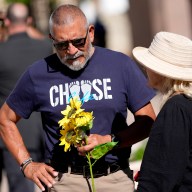ST. JOHN’S, N.L. – Thirty years after Terry Fox dipped his artificial leg in the frigid North Atlantic his fierce fight against cancer is still a driving force in the quest for a cure.
Family and friends launched a research effort Monday to mark three decades since Fox began his Marathon of Hope in St. John’s.
The Terry Fox Research Institute’s Atlantic Node would unite cancer-care experts in Atlantic Canada with those across the country. Its aim is to boost underfunded attempts to move new treatments from the lab to clinics, and to cut regional death rates that are among the country’s highest.
Betty Fox thanked everyone who has kept her son’s dream and legacy alive through annual runs that have helped raise $500 million.
“On Sept. 1, 1980, when Terry was diagnosed a second time with cancer, he said: ‘It has to keep going without me.’ Because of you, Terry still and will always run – not only in Canada but in countries all over the world.”
Project leader Dr. Michael Johnston said cancer cuts an especially devastating swath in Newfoundland and Labrador and the Maritimes, where Fox was welcomed in the first months of his long journey.
“Our Atlantic region by and large has the highest incidence and the highest mortality rate from cancer in all of Canada. Specifically, colorectal cancer is more common in Newfoundland and Labrador than in any other province.
“For lung cancer, women in Nova Scotia and New Brunswick have the highest rates in Canada. We want to help change these statistics.”
The new research strategy was announced at the Mile Zero memorial where Fox began his attempt to run across Canada on a damp, grey morning 30 years ago to the day.
Those who gathered Monday in full sun on the waterfront, including Fox’s parents, brother and sister, said he would be floored by what is still happening in his name.
His mother recalled thinking that it would be more than enough strain for her son to run across British Columbia. But Fox was determined to raise awareness in every province because each is affected by the disease.
When he started out on April 12, 1980, he planned to run a marathon a day – about 40 kilometres – until he made it to the West Coast.
Five months later he had reached Thunder Bay, Ont., where the cancer that had claimed his right leg was diagnosed in his lungs.
Fox died on June 28, 1981 at the age of 22. He is celebrated as one of Canada’s most beloved heroes while his feat is honoured with runs around the globe.
His name adorns schools, roadways and statues. But to cancer survivor and researcher Krista Wilkins, the Terry Fox legacy means so much more.
“The run is why I’m here,” said Wilkins, who lost her left leg to the same type of osteosarcoma cancer that Fox suffered.
“Without the kind of money, the kind of research that we’ve been able to do, I don’t know if I’d be here.”
Linda Hennebury, who has survived breast and kidney cancer, met Fox along the very first stretch of his run in what was a damp and snowy St. John’s. It was cold, she said, and she handed him a $10 bill for encouragement.
“I like to believe that if he had got $50 that day, well, mine was among the first 50.”
Betty Fox believes everything her son and his family endured was meant to be.
“Him being diagnosed with cancer, doing the run, passing away. And 30 years later, we’re still running. Everybody is really completing Terry’s run. Because it’s not really finished yet until we find the causes of cancer.
“I know Terry’s very proud.”














